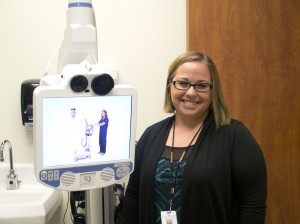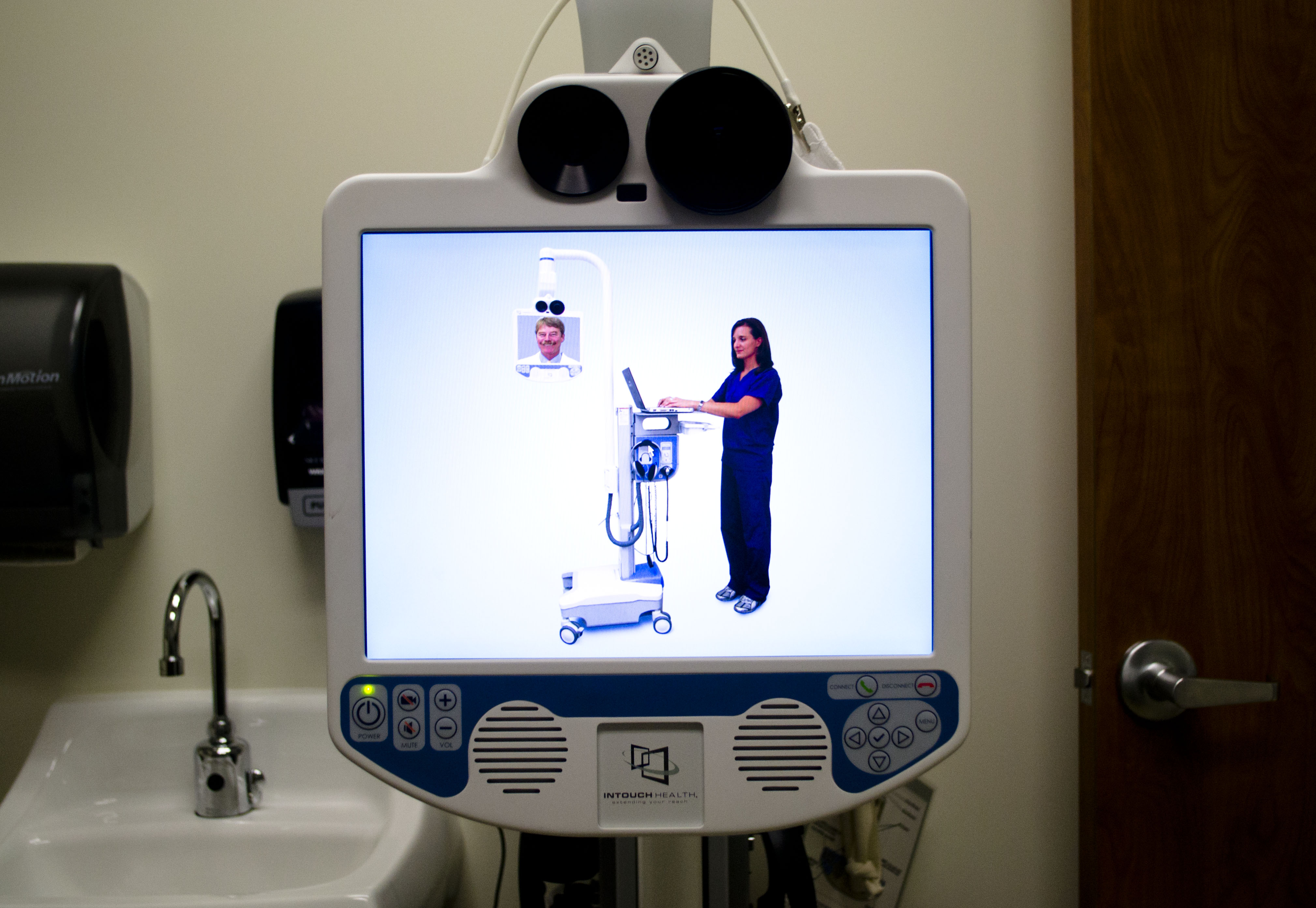Over the course of a few years, Julie lost several of her family members, then a close friend also passed away. Overwhelmed by grief, Julie developed severe depression. She cried daily. Worst of all, she had no one to talk to.
“I was definitely in a tough place with a lot to say and nowhere to say it,” said Julie, a Big Bear Lake resident who preferred not to give her last name for this story.
What she really wanted was a professional counselor, someone to speak to one-on-one in a private setting.
Just over a year ago, Julie’s doctor recommended she try a new program through the Bear Valley Community Healthcare District. Julie was among the first patients of Mindy Mueller, a psychologist offering private therapy at the district’s health clinic.
The thing is, Mueller doesn’t live in Big Bear, or even nearby. Julie would be participating in therapy sessions via video chat.
In June of 2013, the healthcare district began offering counseling with Mueller through a program called TeleConnect Therapies, a computerized video system. Sessions have been in high demand. The program has been so successful for offering quality medical services to Big Bear patients remotely, that the district has plans to expand the program this month.
Think of TeleConnect therapy like Skype or FaceTime, but more advanced. The patient and therapist look at each other on a screen. The therapist can control the cameras on the patient’s end to zoom in or change the angle of the lens. For the patient’s privacy, the Internet connection is extra secure and data is encrypted.
“It’s the coming wave of medicine—especially in rural areas,” said Ray Hino, Bear Valley Community Health District CEO.
When Julie was first seeking help, she had received some counseling at Big Bear’s Lutheran Social Services office. She also spoke to her medical doctor. But before TeleConnect therapy, she had found her mental health options on the mountain to be somewhat limited—a common issue in rural communities.
“There was a great need in Big Bear for more mental health services,” Hino said, adding, “If mental health issues go untreated, it can lead to domestic violence, problems at work or school, all kinds of negative effects.”
Without mental health services, Hino said, more pressure ends up placed on a community’s law enforcement or emergency rooms. Hino recalled one patient, whom he said used to be a regular in Big Bear’s emergency room, who has now been able reduce hospital visits just through sessions with Mueller.

The district secured a $30,000 grant from the California Endowment to pay for the first year of the program. In that first year, 547 Big Bear area patients saw Mueller. Joanne Merrill books their appointments for the clinic. Merrill keeps a notebook on her desk with pages of names written inside—that’s just the waiting list.
“(Mueller) usually books up four or five weeks in advance,” Merrill said, “I’ve even seen people book two months in advance because being seen by her is so important to them.”
Mueller “beams in” to Big Bear from the San Diego area twice a week. Merrill said appointments are often booked back-to-back for 12 straight hours.
But while demand for treatment is high, TeleConnect therapy doesn’t work for every patient. “If a person has a more severe disorder with hallucinations or delusions, it’s hard because they look at the screen and are really distrustful,” Mueller said, “It can be hard for them to know if you’re really there.”
She added that some forms of therapy that she practices with in-person clients, like creating artwork or playing games, don’t work over the screen.
And for some people, the screen just feels weird. “We get the occasional person who says, ‘I don’t want to talk to a TV,’” Merrill said.
But for patients like Julie, the screen is no problem. Julie said sometimes she forgets she’s even talking to a video. “I look her in the eye and she looks at me in my eyes,” she said.
Mueller said some patients are actually more willing to talk to her at a distance since it feels less confrontational and, since Mueller lives out of town, the patients know she’s someone they won’t run into at the grocery store later.
Numerous studies have been conducted on the success of therapy conducted through phone, email or video chat. Most studies find video-based systems like the one at the Brenda Boss facility to be almost as effective as in-person therapy.
If all goes according to schedule, the healthcare district will expand the program to include video sessions with a psychiatrist this month. Mueller, as a psychologist and therapist, does not write prescriptions. A psychiatrist, on the other hand, is a medical doctor.
Mueller thinks the expansion will be an important complement to her services. “The combination of medication and therapy for some disorders is the most effective way to help, so I’m really excited people will have the option,” she said.
Hino also hopes to see the video technology program expand to bring other kinds of medical specialists beyond just mental health to Big Bear in the future. He sees the technology as an effective way to offer quality healthcare on the mountain without having to recruit doctors to move to the area.
So far, many patients seem to agree. Julie calls the day she first heard about TeleConnect therapy an act of God. A lifesaver.
“When I (have a session with Mueller) it’s like everything’s going to be OK, I’ve got someone who’s listening to me and willing to work through this with me,” Julie said. “If you can see that person—even on a computer—it makes a huge difference.”
Read this story on the Big Bear Grizzly
